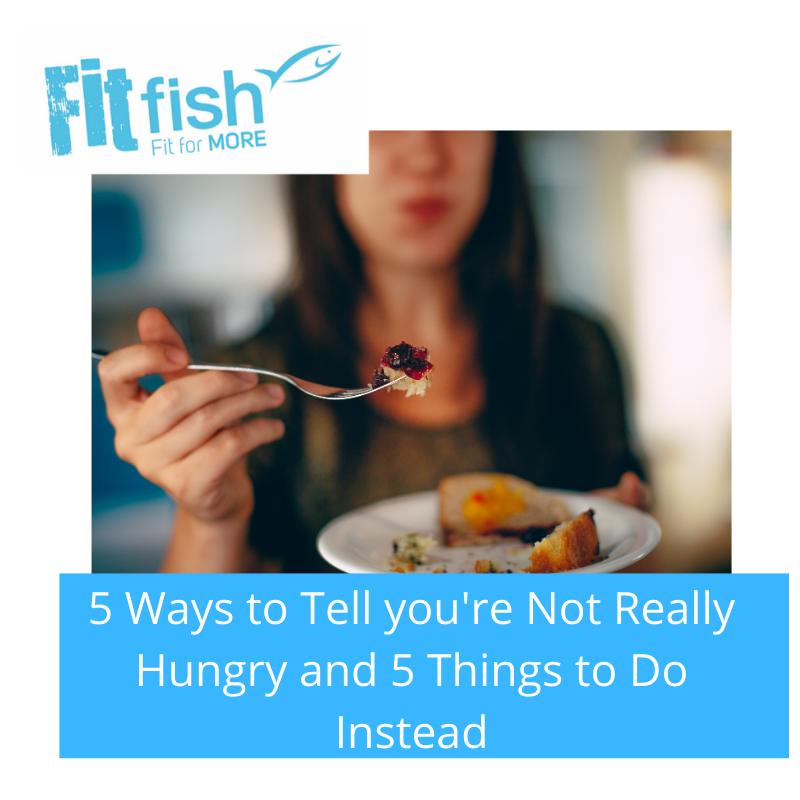5 Ways to Tell you’re Not Really Hungry and 5 Things to Do Instead

This video, and the blog below, reveals 5 ways to tell that you are not really hungry and 5 things to do instead. Ideally, we would only eat when we are physiologically or biologically hungry, or for enjoyment, with no guilt whatsoever afterwards. Unfortunately, that’s not the case and anything outside of this definition can be classed as either self-sabotaging behaviour, emotional eating, or an unhealthy habit that we are trying to break. It’s really helpful to know when you’re eating for reasons other than hunger or pure enjoyment with no guilt, as recognising this is the first step to tackling these behaviours.
So how do you know you’re not eating because you are genuinely hungry? Here are five ways to tell…
- The urge to eat comes suddenly. When you’re genuinely biologically hungry, the feeling comes gradually. You start to feel a little hungry and might start thinking you will do something about it soon. Your stomach might be rumbling; you might even feel a bit faint and at that point you know that you need to eat – that’s real hunger. But with hunger that’s not real it comes suddenly, without the other physiological signals.
- You have the urge to eat a certain food. It might be chocolate, or it might be crisps. It might be an urge for a specific food group; for example, you might just want carbs or just want something sweet. Whereas if you are actually physiologically hungry you just want your next meal or your next snack to take those feelings away and to feel satisfied.
- It can occur even after you’ve just eaten. You could have just had your evening meal but feel like eating something else. With biological hunger, once you have eaten your meal you will not be hungry anymore; the meal will have satisfied the physiological need and there will always be a gap before feeling genuinely hungry again.
- You feel good initially, but then you feel guilty afterwards. If you’re eating because you’re genuinely hungry there won’t be any guilt attached to it. But if you’re eating when you’re not hungry you might feel good for a few seconds, minutes, or even a few hours, but if you feel any guilt afterwards, that’s a sign that you’re not eating because you’re hungry.
- You don’t feel that healthy fullness that you get when you eat when you’re genuinely hungry. With genuine hunger, you eat a little bit and you start to feel satisfied. but you don’t get that feeling eating when you’re not actually biologically hungry.
So, once you’ve recognised that you are not actually hungry, what can you do about it? Here are five things you can do instead of reaching for some food:
- The first thing is to pause. Stop. Count to 10. You might not be in a place where you want to do this, but if you do stop, take a deep breath and count to 10, then you will feel better. You will have moved on and you will have missed that initial trigger that was trying to get you to eat that food. Count to 10, count to 20, whenever it takes, and let it pass.
- You could have a small amount of what you fancy. Try to avoid falling into the trap of thinking “I can’t really have that, that’s bad, so I’ll have some cereal instead.” And then you might have a banana, maybe an apple, an orange, and then a piece of toast. It can quickly mount up to a bit of a binge when you’re not actually going for what you wanted in the first place. It’s often better just to have a small amount of the thing you actually wanted.
- Reflect on what the real emotion was, the real need that drove you to go and get that food or made you feel like you wanted that food, and try and meet that actual emotion. Whether it was sadness, or anger or something else, try and meet it in another way.
- Ride the emotion with God. Dive into the Bible; use the thematic index or use a Google search to find some verses that relate to the emotion that you’re experiencing, for example, anger, hurt or pain. Use those verses to help you pray and worship.
- Distract yourself. Keep your hands, or your mouth, busy. You might want to have a herbal tea or some water; maybe do some knitting or some crochet; do a puzzle; read a magazine. You could also try cleaning your teeth or having some kind of mint or peppermint tea.
I hope you find these tips and tricks helpful for breaking away from eating for reasons other than genuine hunger.
Comments
BRIAN MCMILLAN says
Hi Gaynor
nice one !
how can you tell the difference between hunger and thirst ?
regards
Brian
Replies
ADMIN says
Hi Brian
Thirst will often involved a dry mouth and a headache. Hope that helps!
Replies
Add comment
Add comment
Add comment